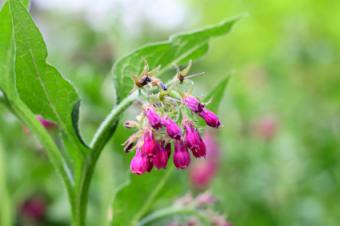
Ancient herbalists once listed comfrey tea as one of the best remedies for many serious ailments. The great herbalist Nicholas Culpepper (1616-1654) described comfrey tea as a remedy for internal bruises, 'spitting of blood', and many diseases. Today, research provides a mixed picture of comfrey as both a healing herb and an herb that may cause liver damage and cancer. Herbalists recommend comfrey for external use only, and comfrey remains a useful curative when used on broken bones, sprains and other external ailments. Comfrey tea also makes an excellent organic fertilizer for the garden.
Properties of Comfrey
Comfrey (Symphytum officianale) has been used since ancient times as an herbal remedy. The name "comfrey" comes from the Latin words "con firma." In ancient Greek and Roman medicine, comfrey was also known as "knit bone" for its ability to speed healing of broken bones. The roots were soaked in wine or boiled in water, and a compress of the resulting comfrey tea or the boiled roots themselves were applied to the wound.
Native to Europe, comfrey grows wild in damp, grassy places like riverbanks and ditches. While skilled herbalists may harvest it in the wild, most people interested in comfrey either purchase it from a reputable seller or grow cultivated comfrey.
Comfrey as a Healing Herb
Comfrey's healing properties are legendary. In addition to Culpepper's extensive writings on comfrey, comfrey is mentioned throughout many herbal and medical texts since Greek and Roman times. When few alternatives were available, people turned to comfrey to cure:
- Broken bones
- Sprains
- Bruises
- Arthritis
- Gastric ulcers
- Burns
- Acne
Modern herbalists recommend using comfrey only as an external herbal remedy for broken bones, sprains, bruises and burns. Recent research indicates that certain chemicals in comfrey tea may cause liver damage, cancer, or contribute to pre-cancerous conditions. An FDA report also implicates comfrey in the death of two people in the United States. These people took excessive amounts of comfrey, but the FDA thought it prudent to issue a warning against consuming comfrey tea until more data demonstrated its safety.
Much of the research demonstrates conflicting results, but until the final word is in, it may be best to exercise caution and use comfrey only as an external treatment.
Uses of Comfrey Tea
If you choose to take comfrey tea, it is strongly recommend that you do so under the guidance of a qualified herbalist or physician. Comfrey tea is often recommended for colds, sore throats, and bronchitis.
Used externally, comfrey appears to be relatively safe. The Comfrey Clearninghouse provides an overview of comfrey's use in herbal medicine and the author's personal research into medicinal uses of comfrey. An external salve or ointment of comfrey may be used to speed healing of broken bones, cuts or wounds. Never apply comfrey to broken skin. Apply it instead to the skin around the affected area.
Comfrey Research
Present-day research points to comfrey's drawbacks and limitations as an herbal remedy, but it also provides compelling evidence for some of comfrey's healing benefits. One of the most interesting studies on comfrey's use as a bone treatment involved a study of rats given a homeopathic dose of comfrey after oral implants were surgically inserted. Although this was only a small study, the images taken of the implant area among the group given comfrey demonstrated an increased bone density, thereby supporting comfrey's reputation as a 'bone healer'.
Another European study examined comfrey ointment use on sprained ankles. Studies indicated that patients using the comfrey salve experienced less pain and swelling than those with sprained ankles who did not use the comfrey salve.
Use of Comfrey in Agriculture
Comfrey also contains several other unusual and beneficial properties. It contains a very high amount of vegetable protein, and in some places may be used as a livestock feed or supplement. Gardeners may also brew and cool comfrey tea to sprinkle over the garden as an organic fertilizer. It's high in nitrogen, phosphorous and potassium or potash, the nutrients needed for plants to grow, and completely natural.







